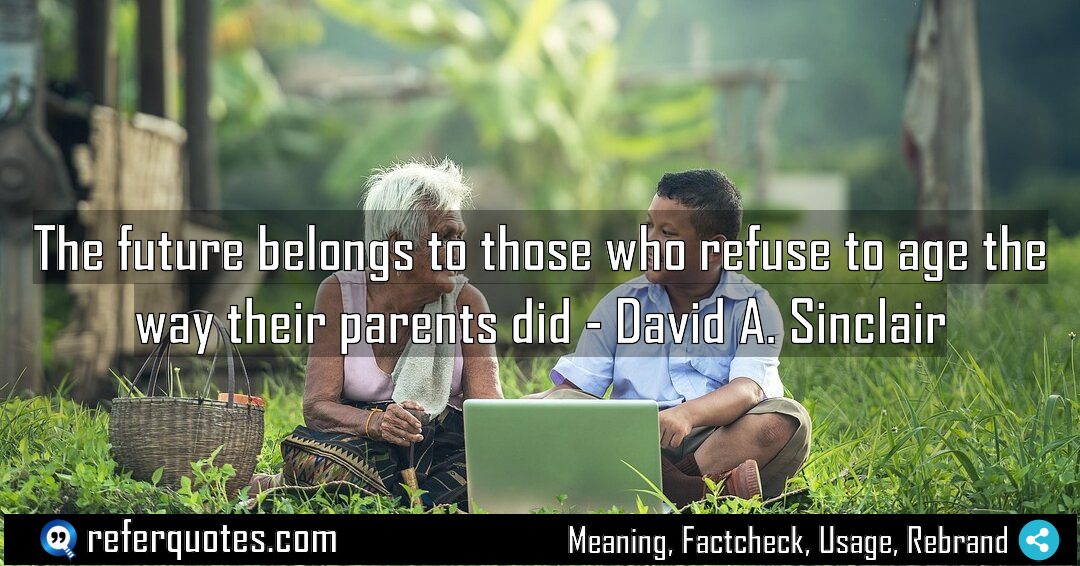
The future belongs to those who refuse to age… not by fighting wrinkles, but by fundamentally challenging our biological destiny. It’s a call to embrace a new science of longevity that could redefine human potential.
Share Image Quote:
Table of Contents
Meaning
This isn’t about anti-aging cream. It’s about rejecting the fatalistic belief that aging is an immutable, one-way street that we must travel exactly as our parents did.
Explanation
Look, for generations, we’ve treated aging like a script we have to follow. Your parents got a certain disease at a certain age, so you just… wait for it. Sinclair is saying that script is now being rewritten. The “refusal” he’s talking about is an active one. It’s about leveraging emerging science—understanding epigenetics, cellular repair, all that good stuff—to create a different health trajectory. It’s the difference between being a passenger on the aging journey and taking the wheel. It’s about healthspan, not just lifespan. Living vibrantly, longer.
Quote Summary
Reading Level78
Aesthetic Score84
Origin & Factcheck
This quote comes straight from David A. Sinclair’s 2019 book, Lifespan: Why We Age—and Why We Don’t Have To. It’s a cornerstone of his argument. You sometimes see similar sentiments floating around, but this specific, powerful phrasing is authentically his, born from his decades of research at Harvard Medical School.
Attribution Summary
Where is this quotation located?
| Quotation | The future belongs to those who refuse to age the way their parents did |
| Book Details | Publication Year: 2019; ISBN: 978-1501191978; Last edition: 2020; Number of pages: 432. |
| Where is it? | Chapter 8: A Path Forward, Approximate page 315 from 2019 edition |
Context
Within the book, this line isn’t just a throwaway motivational quote. It’s the logical conclusion of his life’s work. He spends chapters explaining the “Information Theory of Aging,” arguing that aging is a loss of epigenetic information—a disease that is, in theory, treatable. This quote is the rallying cry at the end of that scientific explanation. It’s the “so what?”
Usage Examples
You’d use this when you want to shift someone’s mindset from passive to active about their long-term health.
- For a friend resigned to “bad genes”: “Hey, you know, the future belongs to those who refuse to age the way their parents did. Maybe that high blood pressure isn’t a foregone conclusion. Let’s look at what the new science says about prevention.”
- In a team meeting about innovation: “This quote applies to our business, too. Are we going to follow the same old industry playbook, or are we going to refuse to ‘age’ the way our competitors do?”
- For anyone feeling their age: It’s a powerful reminder that your biological age and your chronological age are becoming two very different numbers.
To whom it appeals?
Share This Quote Image & Motivate
Motivation Score88
Popularity Score82
Shareability Score86
FAQ
Question: Is this quote just about living longer?
Answer: Not at all. That’s the biggest misconception. It’s primarily about healthspan—the quality of those years. The goal is to compress the period of sickness at the end of life and extend the period of vitality.
Question: So, does this mean we can achieve immortality?
Answer: No, and that’s not what serious scientists like Sinclair are promising. The focus is on “negligible senescence”—staying healthy and functional for a much, much larger portion of your life. It’s about adding more life to your years, not just more years to your life.
Question: What’s the first step to “refusing to age” in this way?
Answer: The first step is always mindset. It’s deciding that your health future isn’t predetermined. From there, it’s about educating yourself on the pillars of longevity: things like nutrition (time-restricted eating is a big one), exercise, sleep, and emerging data on specific molecules that support cellular health.
Similar Quotes
Our future depends on redefining what it means to grow old. That’s the core of Sinclair’s argument, and it’s not just about living longer. It’s about a fundamental shift in…
You know, I’ve been thinking a lot about that line, “The future belongs to those who create remarkable things.” It’s not just a nice quote; it’s a battle cry for…
So, Paulo Coelho tells us “The future belongs to God…” to pull us back from the anxiety of trying to control everything. It’s a powerful reminder to focus on the…
You know, the future belongs to those who are more skilled… it’s a powerful truth. It’s not about who works the hardest, but who works the smartest, constantly evolving. This…
We don’t have to accept aging as inevitable. It’s a radical shift from thinking we’re just passengers on the aging train to realizing we might be the engineers. This quote…
